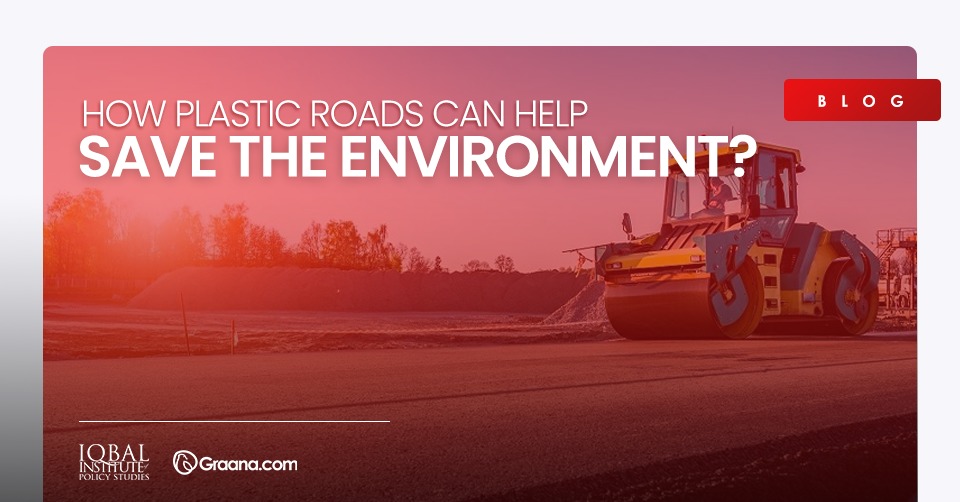
In this century, the focus of development is inclined towards sustainability and recycled goods.
Plastic is a big problem worldwide as it can alter natural habitats and reduce the ecosystem’s ability to adapt to climate change.
It is one of the materials used daily by people and is very useful but non-biodegradable. More than 5 trillion pieces of plastic are in the world’s oceans which can take decades to break down.
Therefore, reducing the use of plastic and recycling is extremely important.
Plastic roads are one way to build sustainable roads that leave less carbon print and are environmentally friendly. They usually contain recycled or repurposed waste products, and there are various types of methods to construct them.
Graana.com in collaboration with the Iqbal Institute of Policy Studies, explores the possibility and effectiveness of plastic roads for environment conservation.
Currently, the trend of plastic roads is less but growing. In a developing country like Pakistan, it is necessary to consider the use of plastic roads for a sustainable and better future.
There are no or fewer records of purely plastic roads, but many countries, such as Australia, India, Indonesia, the United Kingdom etc., have used technologies that incorporate plastic waste in the road material.
It is a cost-effective way of addressing infrastructure needs and reducing its impact on the climate. Plastics leave carbon print and do not decompose, and what better way to mass recycle than to make infrastructure out of plastic. It is either recycled, incinerated or discarded.
Plastic waste is a threat to the planet, and it is important to find solutions for it as it damages marine life and results in tons of greenhouse gas emissions.
The plastic road is an innovative idea that originated in India in 2001. Since then, research has been conducted on it, and it has proven to be a sustainable solution for road construction.
It is highly beneficial as just one kilometre of the road made of plastic can recycle and consume approximately 10 tons of plastic waste. Plastic waste will be reduced to zero if such an innovative method is used worldwide in constructing roads and highways.
Moreover, such roads offer a variety of benefits compared to regular roads. They offer higher sustainability, flexibility, and durability, and they have a lifespan of 3 times longer than the actual roads. Road material is very expensive in this era of high inflation and construction costs. It is not feasible enough.
However, plastic roads are a cost-effective method as they are practically free and made of recycled waste. It takes down the construction cost by several folds.
Since the idea of plastic roads is still in its initial stages and not many countries have adopted it, the methods of construction vary. Each country has experimented in different ways; some use purely plastic methods while some mix with other materials.
Plastic is used in the daily lives of people, from the smallest to the biggest things, hence it is not difficult to collect plastic. The source of plastic roads is the recycled plastics from everyday consumer items such as water bottles and packaging products. These roads’ end product is unrecognisable and looks exactly like regular ones.
The process of making plastic roads is easy. Firstly the plastic is collected and sorted out according to different types. It is then cleaned and shredded into a uniform size. The material is melted at 170 degrees and mixed with bitumen. The mixture is laid out for roads, and the plastic road is ready once it is set and dried. It is a less time-consuming and lightweight method.
To conclude, this innovation contributes to reducing the global problem of plastic waste. It can decrease the emission of greenhouse gases by billions of tons, resulting in a better environment and adding positively to climate change. It is a cost-effective and sustainable method of construction.
In Pakistan, there is currently only one plastic road, the first plastic road in Pakistan. It is made in the country’s capital, Islamabad, on Ataturk Avenue.
The collaboration between Capital Development Authority and Coca-Cola made it possible and paved the way for future plastic road networks. It will make the country environment friendly while saving millions of rupees.
Plastic roads are the future of modern construction, and countries should adopt such materials in their methods for sustainable development and growth.
ISLAMABAD: Capital Development Authority (CDA) is currently undertaking a major Rs652 million project to upgrade…
Karachi – Mayor Barrister Murtaza Wahab has announced the launch of a citywide anti-encroachment operation…
ISLAMABAD: CDA Chairman Muhammad Ali Randhawa has directed the immediate restoration of 23 non-functional water…
ISLAMABAD: In a major relief for the real estate sector, the federal government has decided…
DHA Islamabad-Rawalpindi (DHAI-R), one of the most trusted names in Pakistan’s real estate landscape, is…
ISLAMABAD: Chairman Capital Development Authority (CDA), Muhammad Ali Randhawa, chaired a comprehensive review meeting on…